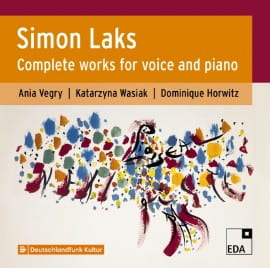Long dedicated to the promotion of lesser-known composers and repertoire from Central Europe, EDA Records just came out with a terrific new offering—a two-CD set of songs by Szymon Laks (1901-1983). This recording is a truly remarkable achievement for many reasons, especially because Laks is remembered these days mainly for only one song: his 1961 Elegia żydowskich miasteczek [Elegy for Jewish Villages] to words by Antoni Słonimski. Thanks to this double CD album, we find that Laks was a prolific and successful master of the traditional art song genre, the French chanson, folk music, and even the cabaret and music-theatre variety show musical entertainment.
The arrangement of forty-five songs on this recording is largely chronological, with Disc 1 featuring Laks’s compositions predating the World War II years, and Disc 2 encompassing music written after the composer’s harrowing wartime ordeal as a German concentration camp inmate. The entire compilation showcases an admirable stylistic variety that, in spite of its breathtaking musical range, firmly retains Laks’s personal imprint as a neoclassical composer whose musical language remained close to that of the Parisian group of composers, known as Les Six.
Another fascinating aspect of this anthology comes across in the composer’s choices of poetic texts. Twentieth century Polish authors predominate with the greatest number of poems—fourteen in fact—by Julian Tuwim (1894-1953), with whom Laks had a particularly close and long standing artistic relationship. As to the other authors, four songs were written to texts by Wanda Maya Berezowska (1925-1970) and another four to words by Tadeusz Śliwiak (1928-1994). The two settings of texts by Ludwik Żuk-Skarszewski (1905-1983) are particularly poignant as Laks and Skarszewski were members of the Auschwitz orchestra during their internment in the concentration camp. The Żuk-Skarszewski songs date from 1974 after Laks accidentally found out that his wartime friend was alive. This discovery prompted Laks to return to writing music several years after he decided to stop composing altogether.
Other lyrics to songs on this album were provided by Stanisław Baliński (1898-1994), Jarosław Iwaszkiewicz (1894-1980), Mieczysław Jastrun (1903-1983), and Antoni Słonimski (1895-1976), with only one text by the best-known Polish Romantic era poet, Adam Mickiewicz (1798-1855). There are also a few texts by French authors Claude Aveline (1901-1992) and Jaques Audiberti (1899-1965), and several folk-based texts, most notably the cycle of Eight Jewish Folk Songs, featuring traditional Yiddish lyrics, and two touching Polish settings of Jezusek [Little Jesus] and O matusiu moja [Oh, my dear mother]. Overall, the rich and varied selection on this two-CD album provides a new perspective on Laks as an important and prolific song composer, and that’s not counting his cycle of twenty songs Z mroków i świtów/Ombres et lumières, which were published in Polish and French in 1948.
A lot must also be said about the very high production values of this recording. Ania Vegry, the London-born soprano soloist has a pure and engaging voice that perfectly suits all texts, be they Polish, French, or Yiddish, and delivers them throughout with innate conviction. Dominique Horwitz, an actor and a chansonnier makes a guest appearance in one terrifically entertaining cabaret song, Le Géneral. Speaking of guest appearances, it is impossible not to be totally charmed by Mieczysław Fogg, a legendary Polish chansonnier in his 1934 recording of Tuwim’s hilarious text, Alkoholic, included here as a bonus track. On all other tracks of this two CD set, pianist Katarzyna Wasiak meets head-on the challenges of often complex keyboard textures and ever-changing musical styles with natural ease and aplomb. The splendid acoustics of Jesus-Christus-Kirche in Berlin’s southwestern district of Dahlem add much to the ambience of this fine recording.
Special laurels and great appreciation are unquestionably due to Frank Harders-Wuthenow, the executive producer and the spiritus movens for this entire project. His extensive article on Laks in the accompanying booklet provides many fascinating insights into the composer, his songs, and the poets whose texts were used, as well as to his circle of friends, like Tola Korian, Hanna Szymulska, Antoni Szałowski, Antoni Słonimski, and Aleksander Tansman. It is comprehensively illustrated with photographs from Laks’s family archive and enriched with scans of original typed texts for Tuwim’s Alkoholik and Walczyk with Laks’s own, penciled annotations. Also included is a text by the composer’s son, André Laks, My Father and His Poets, with additional insights into the literary and musical aspects of this recording and Antoni Buchner’s searching article on Laks’s Eight Yiddish Folk Songs. As if this one booklet was not enough, a second booklet with German and English translation of all forty-five texts is also enclosed. Once simply could not imagine a better, more thorough and dedicated presentation than this remarkable EDA Records edition of the Complete Works for Voice and Piano by Simon Laks.
